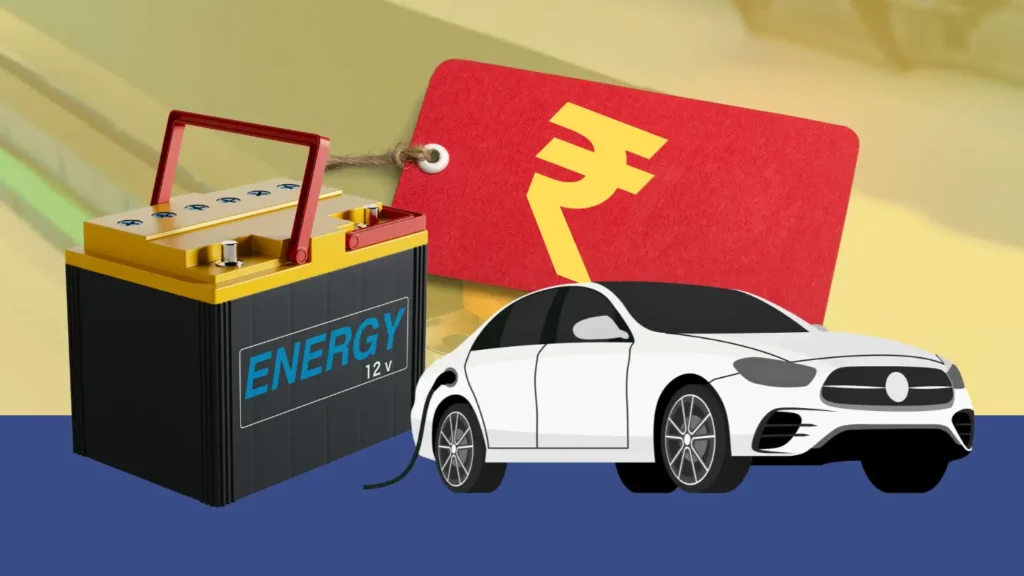
Key Points
The cost of an EV battery in India depends on the battery’s capacity and the specific vehicle model.
On average, the cost is about ₹15,000 to ₹20,000 per kilowatt-hour (kWh).
For example, a common EV with a 30kWh battery might cost between ₹4,50,000 and ₹6,00,000 to replace.
However, actual costs can vary, and some models like the Tata Nexon EV have higher replacement costs, reported at ₹7,00,000 for its 30kWh battery, which is surprisingly higher than the general range.
Costs can differ due to the manufacturer, battery type (e.g., LFP vs. NMC), and additional fees like labour and taxes.
It’s also worth noting that battery prices are expected to decrease over time due to technological advancements and falling raw material costs.
This survey note provides a comprehensive analysis of the costs, drawing from various sources and specific model examples to offer a detailed understanding.
Research indicates that the average cost of an EV battery pack in India ranges from ₹15,000 to ₹20,000 per kilowatt-hour (kWh).
This estimate is supported by multiple sources, including Thunderplus Blog and E-Vehicle Info, which suggest this range as a baseline for replacement costs.
For instance, a 30kWh battery, common in many Indian EVs, would cost between ₹4,50,000 and ₹6,00,000, while a 40kWh battery could range from ₹6,00,000 to ₹8,00,000.
To provide concrete examples, we examined several popular EV models in India and their reported battery replacement costs:
These examples highlight variability, with the Tata Nexon EV showing a higher per-kWh cost, possibly due to its use of Lithium Iron Phosphate (LFP) batteries, which, despite being cheaper in raw materials globally, may have higher replacement costs in India due to import and assembly factors.
The type of battery significantly impacts cost. LFP batteries, used in models like the Tata Nexon EV, are generally cheaper in terms of raw materials compared to Nickel Manganese Cobalt (NMC) batteries, which are used in models like the Ola Electric Scooter (as per E-Vehicle Info).
However, replacement costs in India can be influenced by local manufacturing, import duties, and brand pricing strategies.
For instance, the Ola S1 Pro’s 4kWh battery replacement cost is around ₹87,298, or ₹21,824.5 per kWh, which is higher than car battery estimates, reflecting differences in scale and technology for two-wheelers.
Internationally, EV battery pack costs have been declining, with reports like BusinessToday noting a drop to $78 per kWh as of September 2024, equating to about ₹6,474 per kWh at current exchange rates (1 USD ≈ 83 INR).
This is significantly lower than Indian estimates, suggesting that local costs include additional factors like taxes and import duties.
Future projections, such as Goldman Sachs’ prediction of battery prices falling to ₹8,000 per kWh by 2025, indicate potential cost reductions, which could lower replacement costs in India over time.
The analysis involved web searches for general cost estimates and specific model data, using platforms like IndiaMART for supplier prices and automotive forums like Team-BHP for user experiences.
Discrepancies, such as the Mahindra XUV400’s low reported cost, highlight the need for official manufacturer data, which is often not publicly available. The survey also considered factors like battery size, brand, and regional price variations, as noted in Thunderplus Blog.
| Model | Battery Capacity (kWh) | Reported Replacement Cost (₹) | Cost per kWh (₹) |
|---|---|---|---|
| Tata Nexon EV | 30 | 7,00,000 | 23,333 |
| MG ZS EV | 44.5 | 6,60,000 – 8,50,000 | 14,831 – 19,101 |
| Mahindra XUV400 | 39.4 | 5,00,000 (tentative) | 12,689 |
Note: The Mahindra XUV400 cost may require further verification due to potential inaccuracies.
The cost of EV batteries in India, averaging ₹15,000 to ₹20,000 per kWh, reflects a balance between global trends and local economic factors. Specific models may deviate, with the Tata Nexon EV showing higher costs possibly due to LFP battery pricing in the Indian market.
As battery technology advances and production scales up, costs are expected to decrease, making EVs more accessible. For precise costs, consulting authorized service centres is recommended, given the variability observed.
India’s electric SUV market is getting more exciting than ever. On one side, we have Mahindra — a trusted…
Ultraviolette Automotive has once again raised the benchmark in the electric two-wheeler segment with the introduction of Ballistic+, a high-performance…
Gagan Choudhary, one of India's trusted automotive content creators with over 1.89 million YouTube subscribers, recently shared his in-depth experience…
ZELIO E Mobility, one of India’s rapidly rising electric two-wheeler manufacturers, has launched the facelifted version of its popular low-speed…
Ultraviolette Unveils F77 Ballistic Plus: India’s First AI-Powered Motorcycle Upgrade With Zero Hardware Change. Bengaluru-based electric performance motorcycle manufacturer Ultraviolette…
Renault has been spotted with a new test mule believed to be the 2026 Renault Kwid EV, giving fresh impetus…
This website uses cookies.